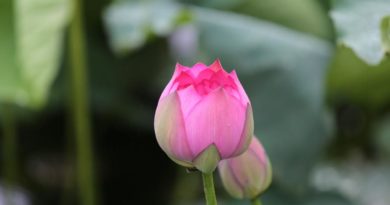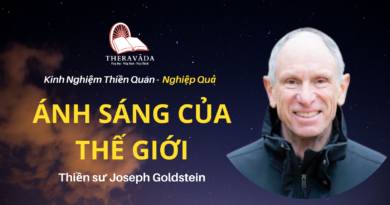A DISCOURSE ON MALUKYAPUTTA SUTTA – VIPASSANA QUESTION II & III
A DISCOURSE ON MALUKYAPUTTA SUTTA – VIPASSANA QUESTION II
Now I shall deal with the second question posed by Buddha for Malukyaputta to answer.
“Ye te sotavinnaeyya sadda assuta assutapubba, na ca sunasi, na ca te hoti suneyyanti, atthi te tattha chando va rago va pemam va.”
“How do you answer this, Malukyaputta? Answer me as best you can. There are certain audible objects which you have never heard previously, either in the immediate or remote past, or at the present moment. Neither can you hope to hear them in the future. Can such objects arouse desire, lust and affection in you?”
Malukyaputta replied that no desire or lust or affection could possibly arise out of sounds or voices that one had never heard before in the recent or remote past, or that one had not been hearing at present, or that one could not hope to hear in the future. This answer is appropriate. On hearing a pleasant voice and cognizing the individual who makes it, the hearer develops affection or attachment for the owner of the voice. As attachment is developed //kilesa// is brought into play and the consequences mentioned before follow. If one meditates on hearing, //kilesa// will be kept away. Reference is invited to what I have previously spoken about the phenomenon of seeing.
PANNATTI AND PARAMATTHA
What has been discussed earlier about the //vithi// relating to eye-consciousness applies //mutatis mutandis// to the stream of consciousness that I am now talking about; and so I give below the gist of the //vithi// relating to ear-consciousness.
In the phenomenon of hearing an audible object enters the avenue of the ear-door; and we say that the sound is heard. This is the first //vithi// relating to ear-consciousness.
Then the ear-consciousness makes due investigation as to the nature of the sound it receives. This is the first //vithi// relating to mind-consciousness.
In the second //vithi// of mind-consciousness, //nama//, name, suggested by the sound is cognized.
In the last //vithi// of mind-consciousness, //pannatti//, concept conveyed by the name given to the sound, is apperceived.
As an object makes the sound, the ear just hears it. If you note this with mindfulness not going beyond it, you call a halt to the process of hearing. The stream of ear-consciousness stops flowing then and there. But if you are unmindful, your mental formations and activities will be brought into play when you may recall the sound you hear and think over it. That means the stream of mind-consciousness has taken over. Even then, this //vithi// of mind-consciousness is only aware of the sound. //Pannatti//, concept, has not yet formed. If you can note this with mindfulness, your apperception ends here, stopping at the stage of the abstract (//paramattha//) idea of sound. If you fail to call a halt to further mental activities, the second //vithi// would apperceive the concept of the individual making the sound, and furthermore, the third //vithi// will proceed to distinguish the sex of the individual, and this will be followed by the development of affinity or repulsion that he instils in your mind. In this way //vithi// conjures up //kilesa//. It is, therefore, imperative that you meditate on hearing just as you hear. I have summarised these statements as follows:
If you fail to note the phenomenon with mindfulness, you end up with //pannatti// knowledge.
To obtain //paramattha// knowledge the following should be borne in mind.
Note with mindfulness the instant you hear. (Note as soon as the //vithi// of ear-consciousness occurs. Or, failing that, note as soon as the //vithi// of mind-consciousness occurs).
Stop the flow of the process of thought at hearing. (If you can do this, the second //vithi// of mind-consciousness cannot arise.
This is in accordance with the saying: Sute Sutamattam bhavissati.
Then you can distinguish //nama//, mind, from //rupa//, matter. (What you hear is matter at work. When you are noting, mind is at work. Mind and matter are thus distinguished. Both the hearing and the noting appear to dissolve at the next instant.)
In the end you will recognize the Three Marks of //anicca, dukkha and anatta//.
FAILURE TO MEDITATE ON SADDA ON HEARING
- Saddam sutva sati muttha, piyam nimittam manasi karoto. Sarattacitto vedeti, tanca ajjhosa titthati.
- Having heard Sadda, sound, one loses mindfulness, and, getting absorbed in the charms created by it, one feels the onset of desire that tries to imbibe it.
When an audible object presents itself at the ear-door, the hearer tries to appreciate it, generally expecting it to be sweet and agreeable. But it usually tends to induce unwholesome thoughts, speech and actions. While he is paying attention to what he is hearing, he loses mindfulness. Desire arises in him if it is a pleasant sound. He takes in what he hears as if he is ingesting or imbibing it. Whenever he recalls it, desire re-appears and torments him again. The story of Prince Nanda illustrates this point.
NANDA THERA
Prince Siddhattha and Prince Nanda were half-brothers, the former being born of Maha Maya, and the latter of Maha Pajapati Gotami, both being sisters wedded to King Suddhodana. Prince Nanda is four or five days younger. When Maha Maya died seven days after the birth of her son, Maha Pajapati Gotami left her own son in the care of royal wet-nurses and brought up Siddhattha breast-feeding him herself.
Prince Siddhattha became Buddha after enlightenment, and came to Rajagaha to spend the first Retreat there. Three days after his arrival King Suddhodana arranged a wedding feast for his second son, Prince Nanda, betrothed to Princess Janapada Kalyani. As Buddha was invited, he came to the palace where he had his meals offered to him. When he was about to return to the monastery, he told Prince Nanda to take his (Buddha’s) bowl and come with him. The Prince, out of fear and awe for his elder brother, did as he was told, expecting that Buddha would take back his bowl and discharge him at any time. As he was about to leave the palace, Princess //Janapada Kalyani// called out to him requesting, “My Lord Prince, come back quickly!”
But, once at the monastery, Buddha asked his younger brother if he would become a monk. The Prince had no mind to don the yellow robe, but overwhelmed by awe he said, “Yes.” So he was ordained. But he was never happy. So, one day, he complained, “I am not happy in the practice of this noble conduct. I can no longer abide in it. I shall revert to laymanship.”
Now it came to the knowledge of Buddha that Nanda Thera was not happy in his monkhood. The Enlightened One, therefore, asked him why. The newly-ordained monk told him that Janapada Kalyani’s words calling him to come back soon were ringing in his ears.
Buddha took his younger brother by the hand and led him to a desolate field, recently burnt out by forest fire, and showed him a maimed old hag of a monkey sitting by the side of a smouldering log. From there he went to Tavatimsa, the abode of the first Plane of Devas, and introduced the love-lorn Prince to a bevy of five hundred beauties, all deities. Then Buddha asked for Nanda Thera’s opinion as to who was beautiful, Princess Janapada or any one of the deities. “Reverend Sir!” he replied, “Janapada Kalyani, when compared to the deities, is very much like that old monkey I saw previously.”
“Nanda”, said Buddha, “Remain happy as a bhikkhu! I promise you that you shall win one of the beauties you are seeing now.” When the two came back from the abode of the Devas, Nanda Thera became diligent in the practice of priestly conduct in the fond hope that one day he would have his desire for a deity fulfilled.
Now words went round the monastery that Nanda Thera was practising the dhamma with an eye to getting a beautiful deity for a wife. He was likened by his associates to a daily wage earner, or even a bonded slave, who worked for material benefits. He became greatly mortified. He secluded himself, bent his mind on the object of //kammatthana// and with the utmost effort and determination practised meditation till all //kilesas// dried up in his inner self. Ultimately he won the Path and its Fruition and became an Arahat.
The lesson to be gained from this story is that, before being able to note with mindfulness the sound that one hears, one tends to hear it again and again as one recalls it. Then it gets stuck to the mind. The mind takes in all //vedana//, sensations, conjured up by //tanha//, craving.
- Tassa vaddhunti vedana, aneka saddasambhava. Abhijjha ca vihesa ca, citta massupahannati. Evam acinato dukkham, Ara Nibbana vuccati.
- A multitude of passions such as covetousness and rage, springing from //sadda//, sound, torments him who takes a firm hold of it, with the consequence that his mind becomes burdened with vexation. Nibbana, therefore, remains far away from him who would carry the load of suffering rather than meditate.
This needs no further elucidation as enough has been said about the attitude of mind on seeing, which, in the present context, may be substituted by hearing.
MEDITATING ON SADDA BRINGS NIBBANA NEAR
- Na so rajjati saddesu, sadda sutva patissato. Virattacitto vedeti, tanca najjhosa titthati.
- Passion remains undeveloped in him who recollects with mindfulness the //sadda// that he has heard. Thus freed from lust, he refuses to imbibe it.
- Yathassa sunato saddam, sevato capivedanam. Khiyati nopaciyati, evam so caratissato. Evam apacinato dukkham, santike nibbana vuccati.
- Listening to an ear-object, a yogi just hears it and just feels that he hears it, without assimilating //sadda//, created by it. With him suffering ceases. He should practise meditation in that way; and if he so practises it, he is said to be within sight of Nibbana.
All these stanzas need no further elucidation, What has been said about seeing applies //mulatis mutandis// to hearing, and this also applies to summaries given in the form of aphorisms.
* * *
VIPASSANA QUESTION III
Buddha posed the following third question for Malukyaputta to answer.
“Ye te ghanavinneyya gandha aghayita aghayitapubba, na ca ghayasi, na ca te hoti ghayeyyanti, atthi te tattha chando va rago va pemam va.”
“How do you answer this, Malukyaputta? Answer me as best you can. There are certain odorous objects, //gandha//, which you have never smelled previously, either in the immediate or remote past, or even at the present moment. Neither can you hope to smell them in the future. Can such objects arouse desire, lust and affection in you?”
Malukyaputta replied that it was impossible for desire, or lust, or affection to arise out of //gandha// which had never been smelled or which one could never hope to smell in the future. As desire cannot be developed out of an unknown quality, it is not necessary for a yogi to meditate on it. But those failing to meditate on nose-object and nose-consciousness will remain removed from Nibbana.
FAILURE TO MEDITATE ON GANDHA ON SMELLING
Buddha, satisfied with Malukyaputta’s answer, said, “Sadhu!” and uttered the four stanzas in the same manner as before.
- Gandhim ghatva sati muttha, Piyam nimittam manasi karoto. Sarattacitto vedeti, tanca ajjhosa titthati.
- Having smelled //gandha//, odour, one loses mindfulness, and getting absorbed in the charms created by it, one feels the onset of desire that tries to imbibe it.
Meditating yogis can rarely enjoy fragrant smell. They are mainly concerned with disagreeable odour which they receive with repugnance. Therefore it is quite usual for them to have a longing for fragrance. This is attachment which makes one forgetful of the dhamma.
- Tassa vaddhunti vedana, aneka gandhasambhava; Abhijjha ca vihesa ca, cittamassupahannati. Evam acinato dukkham, ara nibbana vuccati.
- A multitude of passions such as covetousness and rage, springing from //gandha//, odour, torments him who takes a firm hold of it, with the consequence that his mind becomes burdened with vexation. Nibbana, therefore, remains far away from him who would carry the load of suffering rather than meditate.
Here, as previously, the emphasis is on the fact that failure to meditate keeps Nibbana away.
MEDITATING ON GANDHA BRINGS NIBBANA NEAR
- Na so rajjati gandhesu, gandham ghatva patissato; Virattacitto vedeti, tanca najjhosa titthati.
- Passion remains undeveloped in him who recollects with mindfulness the //gandha// that he has smelled. Thus freed from lust, he refuses to imbibe it.
- Yathassa ghayato gandham, sevato capi vedanam; Khiyati nopaciyati, evam so caratissato. Evam apacinato dukkham, santike nibbana vuccati.
- Smelling a nose-object, a yogi just gets the smell and just feels that he gets it, without assimilating //gandha// created by it. With him suffering ceases. He should practise meditation in this way; and if he so practises it, he is said to be within sight of Nibbana.
To wash your hands of //dukkha//, suffering, note with mindfulness everytime the sense of smell presents itself to your mind. Now I shall go onto the next subject relating to the sense of taste. It will show you how to practise Vipassana.









